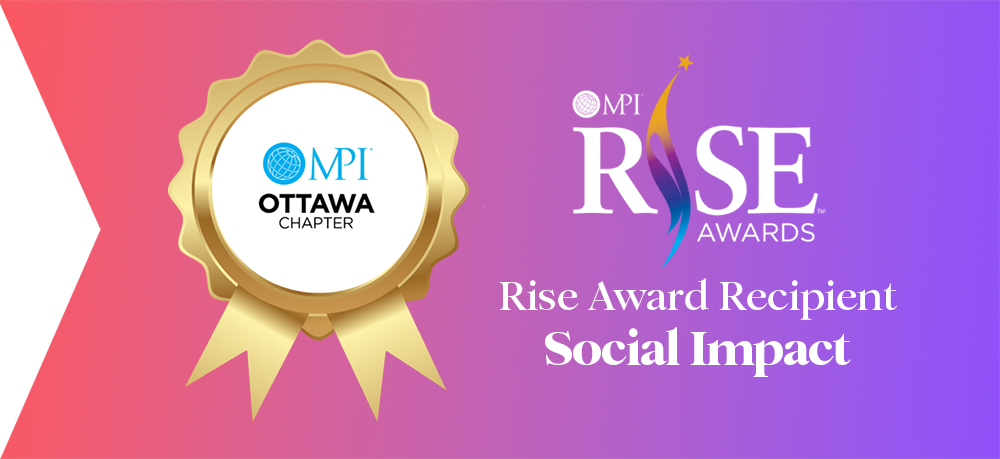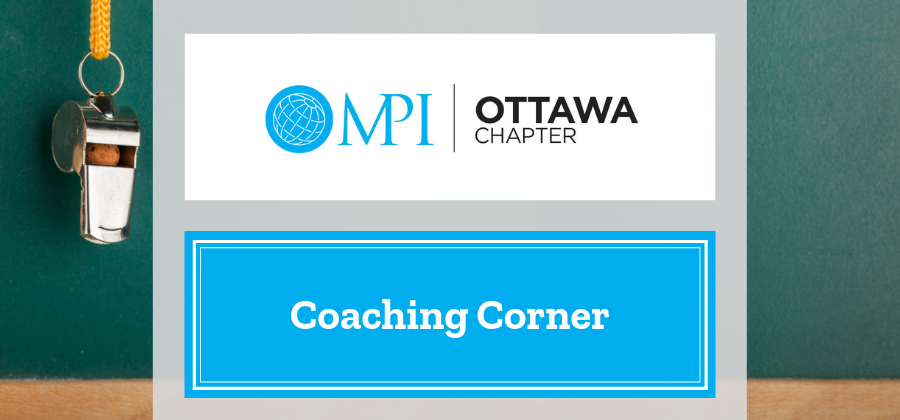Studying for the Certified Meeting Professional exam? MPI Ottawa has you covered!
Learn More
Check out all the exciting events taking place in the upcoming year!
Learn More


Coaching Corner: Tips to Help You Enhance Your Interviewing Skills

Your resume has been updated, you reviewed your cover letter and you have applied to a number of different event related job postings in the city. After a couple of weeks the time has come and you have been called in for an interview with a reputable organization in the industry. The excitement is soon overcome by a feeling of panic and fear, as you realize you may not be as prepared as you think for the interview.
Interviewing can be stressful and nerve-wracking for anyone. Whether you are just graduating from school and entering the workforce or looking for a change in your professional career. This article is going to focus on different tips you can follow in order to improve your interviewing skills.

Do Your Research
There is a lot of preparation and work that needs to take place before you walk into the interview room. Start by researching the organization you are interviewing with. Look to see what types of events they plan or host, what their mission and core values are, and see if you can find an organizational structure or past annual reports. The interviewers might ask you what you know about them, and you want to make sure you come prepared.
If you are given the names of those who are interviewing you, you can also look them up on LinkedIn. Get a sense of who they are and their past experiences. It will help you feel less nervous if you walk into the room already knowing a little bit about them.
Rehearse
After doing a number of interviews you start to recognize similar questions that are asked. Situational questions can be a large part of an interview and is a great way for the interviewer to get a sense of your different strengths and skills. Here are a few examples of frequent questions I have been asked:
-
Describe a time you encountered a challenge and how you went about solving it?
-
Name a time you didn’t agree with a colleague and how you dealt with the situation?
-
What are traits you look for in a supervisor or manager?
-
How do you fit within a team and what strengths can you bring to the table?
It is also good to have a 2-3 minute overview of your past experience, almost like an elevator pitch. From all the interviews I have done, nine times out of ten the interview started with the interviewer asking to give an overview of myself and my professional career. You don’t want to spend a long time on this, but you do want to touch upon the key experiences and skills that relate most to the job you’re interviewing for.
Taking note of key words and responsibilities in the job description, holding a mock interview with a friend or family member, or having examples in your head ready to talk about are all things you can do to better prepare yourself for an interview. The more prepared you are, the more confidence you will exude once you walk into that interview room.
Take a Breath
Interviews can be stressful and it can feel like there’s a lot of pressure to out-perform the other candidates that are being interviewed. If you are feeling stressed take a deep breath and collect your thoughts before you answer the questions that are being asked.
You might get asked three to four part questions and when under pressure it might be hard to remember everything that was asked. Bring a pen and a small pad of paper with you to take notes. You can jot down the questions that were asked, take 20-30 seconds to collect your thoughts, and refer to your notes if needed.
Just be careful to keep eye contact during your interview. Taking notes is allowed, but it can’t be a means to avoid eye contact. It is always better to take a moment to think about an answer, then to rush and risk not answering the question to the fullest.
Dressing to Impress
Not only are you trying to impress the interviewers with your experience and skills, but you also want to impress them with how you dress and present yourself. I am a firm believer that you shouldn’t wear all black. There might be instances where wearing all black is best, but I find that adding a pop of colour to your outfit is a good way to stand out and be remembered. Wearing a colourful blazer, adding a floral scarf to a simple outfit, or wearing a fun-patterned bowtie are just a few ways to add a bit of pop to your outfit.
Another helpful tip is to carry mints with you so you can make sure your breath is minty fresh before meeting your possible future employer. Be sure to carry mints and not gum. It is not a good look to answer questions about your past work experience while chewing on a stick of gum. Having fresh breath, standing tall, making eye contact and giving a firm handshake are all great ways to carry yourself in a professional manner for your interview.
If you are looking for ideas on what types of outfits to wear, or where to go to find good deals, you can check out another recent Coaching Corner article that focused on getting a business wardrobe on a budget.
Be Prepared with Questions to Ask Them
At the end of an interview, it is very common for the interviewer to turn the table and ask if you have any questions for them. This is your opportunity to get more information about the interviewer or organization and show them your interest in working for them.
Try to come up with some creative questions to end the interview with. I’ve never been a fan of asking, “What is the salary for this position?” or “When would the starting date be?” These are questions I would ask only after an offer has been made. If there is no job offer then those questions are not relevant.
Here are some examples of different questions you can ask:
-
What was the biggest hurdle you faced when planning last year’s conference or event?
-
What types of characteristics do you look for in a candidate?
-
What does success mean to you and how do you go about recognizing it in the workplace?
By asking these types of questions, you are not only showing an interest in working for them, but you are also gauging if the job will be a good fit for you or not.
Remember, not only is the interviewer interviewing you, but you should be paying attention to their demeanor, what they might be looking for and if it will be a good fit for both you and the employer.
Always Remain Professional
At the end of the interview, thank each person who interviewed you before you leave. Then follow-up with a thank you note reiterating your interest in the position and thanking the interviewer for their time. This can be done 24-48 hours after your interview took place. Doing this won’t necessarily get you the job, but it may give you an edge over the other candidates who may not have bothered sending a note.
It is also important that you remain professional during the post-interview period. It can take time for an employer to make a decision. The last thing you want to do is look desperate and come off as annoying.
It can also be very tough to hear you didn’t get the job. Interviews take a lot of prep work and looking for a job can be a full-time job in itself. Remember that just because you didn’t get the job doesn’t mean you are incapable. It just means there was a better candidate who may have been better suited for the role. Always take rejection with a positive attitude and learn from the experience. The event industry in Ottawa can be small and there is high chance you could run into your interviewer in the future, so it is important to always maintain a positive and professional image.
Interviewing is a skill in itself and if you put in the appropriate leg work finding the right job will come sooner than you think. Have confidence in yourself and know what skills you can bring to the table.
If you have any questions about this article, student membership or have topics you would like to see in future “Coaching Corner” articles, please don’t hesitate to send a message to students@mpiottawa.ca.
 Article written by Meg LaPlante, Royal College of Physicians and Surgeons of Canada
Article written by Meg LaPlante, Royal College of Physicians and Surgeons of Canada
Article edited by Rozanne Lyons, CMP, Intertask Conferences


Leave a commentOrder by
Newest on top Oldest on top